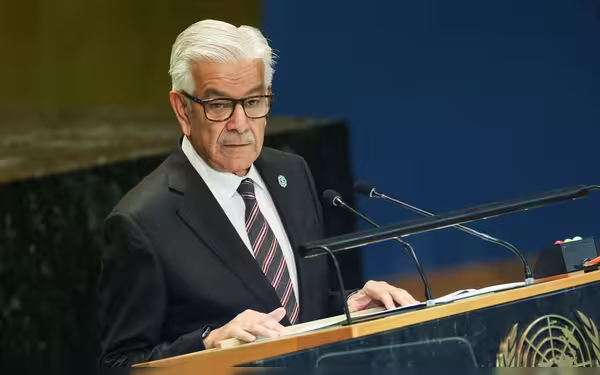Saturday, November 16, 2024 05:52 PM
Khawaja Asif Urges UN to Address Gaza Crisis for Sustainable Development
- Asif highlights Gaza crisis impacts sustainable development.
- Call for bridging $4 trillion financing gap for SDGs.
- Emphasis on accountability for Israel's actions in Gaza.
 Image Credits: dawn
Image Credits: dawnKhawaja Asif addresses the UN, linking Gaza crisis to sustainable development and urging global accountability.
In a world increasingly focused on sustainable development, the ongoing humanitarian crisis in Gaza has raised serious concerns about the feasibility of achieving global progress. Defence Minister Khawaja Asif of Pakistan addressed these pressing issues during his speech at the United Nations ‘Summit of the Future’ in New York. He emphasized that no sustainable development can occur while “tragedies like Gaza are perpetuated by the developed world.” This statement comes in light of the devastating impact of Israel’s military actions in Gaza, which have resulted in the loss of over 41,000 Palestinian lives.
Asif, who is part of the Pakistani delegation accompanying Prime Minister Shehbaz Sharif, highlighted the importance of the ‘Pact for the Future’. He described it as “an expression of our collective determination to respond to the global challenges of security and development that threaten the present and future generations.” The pact aims to provide a pathway for over 100 developing countries to revitalize their development efforts and reform the existing international financial and economic systems that are often seen as unequal.
During his address, Asif pointed out that the pact will only be effective if the commitments made are translated into concrete actions. He stressed the urgent need to bridge the $4 trillion financing gap for the Sustainable Development Goals (SDGs). To achieve this, he called for the fulfillment of longstanding commitments to Official Development Assistance (ODA) and the implementation of the Secretary General’s SDG Stimulus proposal. Asif also urged that 50% of the unused 2021 allocation of Sustainable Development Reports (SDRs) be rechanneled to support these initiatives.
In his remarks, Asif proposed several measures to address the SDG financing gap, including lowering borrowing costs for developing countries and improving their representation in international financial institutions. He also advocated for a review of the sovereign debt architecture to make it more equitable and the adoption of a fair international tax regime. Furthermore, he called for reforms in the World Trade Organisation to facilitate export expansion and development, particularly for developing nations.
Asif underscored the UN’s role as an essential platform for monitoring and implementing these commitments, stating, “The UN, by virtue of its universal membership and mandate, remains an indispensable platform to propel and monitor implementation of these commitments.” He also highlighted the importance of bridging the digital divide, which he believes is crucial for achieving an equitable future. He welcomed the outcomes of the Global Digital Compact and stressed the need to ensure equitable data governance and control over the power of Artificial Intelligence.
In a related statement, Information Minister Attaullah Tarar emphasized that lasting world peace cannot be achieved without resolving the Palestine and Kashmir issues. He called for an immediate ceasefire in Gaza and accountability for Israel regarding the alleged war crimes and genocide being committed against Palestinians. Tarar reiterated that Prime Minister Shehbaz Sharif has consistently raised these critical issues on international platforms, and they will continue to be a focal point during his engagements at the UN.
As the world grapples with these complex issues, it is clear that sustainable development cannot be achieved in isolation from the pressing humanitarian crises that affect millions. The call for justice and accountability in conflict zones like Gaza and Kashmir is not just a matter of political discourse; it is a fundamental aspect of ensuring a fair and equitable future for all. As nations come together to address these challenges, the hope remains that collective action can pave the way for a more just and sustainable world.













